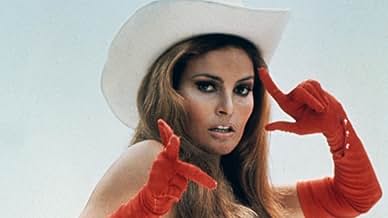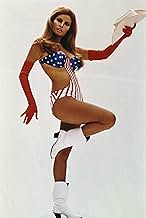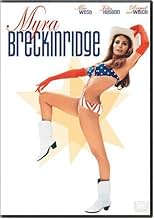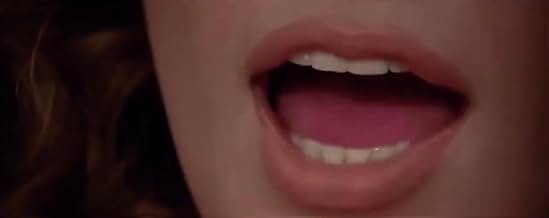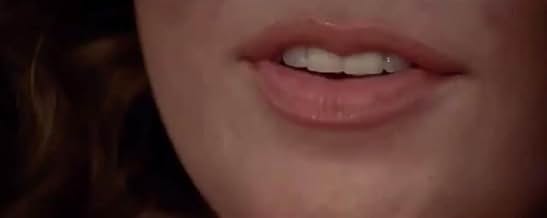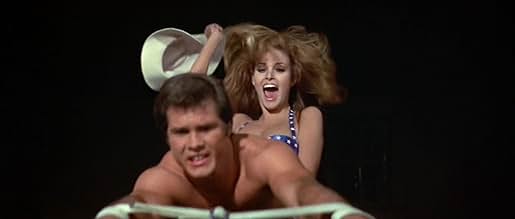NOTE IMDb
4,5/10
3,6 k
MA NOTE
Ajouter une intrigue dans votre langueAfter undergoing gender reassignment surgery, an aspiring actress travels to Hollywood, where she also wants to make a claim on her wealthy uncle's estate.After undergoing gender reassignment surgery, an aspiring actress travels to Hollywood, where she also wants to make a claim on her wealthy uncle's estate.After undergoing gender reassignment surgery, an aspiring actress travels to Hollywood, where she also wants to make a claim on her wealthy uncle's estate.
- Réalisation
- Scénario
- Casting principal
Robert P. Lieb
- Charlie Flager, Sr.
- (as Robert Lieb)
Avis à la une
The book "Myra Breckinridge" is marvelous, and so is its nutty sequel "Myron" (which takes place on the set during the making of the Maria Montez movie "Siren of Atlantis" and, in its original published version, is a diatribe against censorship and finds new ways to use the name Rehnquist). The movie, a big flop in 1970, is not marvelous, but starts intriguingly and still has an aura of the forbidden about it (it was rated X; in 1970 that wasn't a liability, it could be a marketing scheme). The Fox Movie Channel showed the film recently in widescreen and I watched it (the latest in several viewings ) and I failed to notice exactly when it begins to unravel.
In spite of its ultimately depressing and sleazy tone, the movie does have some lovely things in it: the winking girl who pops up in various scenes throughout, Raquel Welch's game, amusing performance, an intriguing visual style, the usage of old movie clips to comment on the action in a meta-cinematic manner (my favorite is the brief glimpse of Marilyn Monroe in the unfinished "Something's Got To Give," a glimpse that could have been furthered), a bizarre underused supporting cast of excellent Old Hollywood character actors (Jim Backus, Kathleen Freeman, Grady Sutton, Andy Devine, John Carradine, etc.) and a short appearance by Genevieve Waite, the star of the director's previous, and only, hit film "Joanna." Waite is also the mother of Bijou Phillips and the ex-wife of John Phillips, of The Mamas and The Papas. (John Phillips wrote the song "A Secret Place" that was used in the film.) I wish I could have been a fly on the wall when the movie was being made. Rex Reed, one of the stars in the film, WAS a fly on the wall and wrote about the fiasco in Playboy magazine. Then he went on The Mike Douglas Show and gave out his Christmas list. To everyone who saw the movie "Myra Breckinridge" he gave a case of amnesia.
I agree with another comment here that the movie has finally caught up with its audience, but only if you know a little something about Old Hollywood and really love cinema.
In spite of its ultimately depressing and sleazy tone, the movie does have some lovely things in it: the winking girl who pops up in various scenes throughout, Raquel Welch's game, amusing performance, an intriguing visual style, the usage of old movie clips to comment on the action in a meta-cinematic manner (my favorite is the brief glimpse of Marilyn Monroe in the unfinished "Something's Got To Give," a glimpse that could have been furthered), a bizarre underused supporting cast of excellent Old Hollywood character actors (Jim Backus, Kathleen Freeman, Grady Sutton, Andy Devine, John Carradine, etc.) and a short appearance by Genevieve Waite, the star of the director's previous, and only, hit film "Joanna." Waite is also the mother of Bijou Phillips and the ex-wife of John Phillips, of The Mamas and The Papas. (John Phillips wrote the song "A Secret Place" that was used in the film.) I wish I could have been a fly on the wall when the movie was being made. Rex Reed, one of the stars in the film, WAS a fly on the wall and wrote about the fiasco in Playboy magazine. Then he went on The Mike Douglas Show and gave out his Christmas list. To everyone who saw the movie "Myra Breckinridge" he gave a case of amnesia.
I agree with another comment here that the movie has finally caught up with its audience, but only if you know a little something about Old Hollywood and really love cinema.
Somebody once said that Gore Vidal's novel "Myra Breckinridge" was un-filmable to begin with. That's probably true. One scene in the book--- a female-on-male rape, described in nauseating, horrific detail--- would have sent most movie directors scurrying in the opposite direction. There's no way that this story could have ever become a classic mainstream movie. But it's not all that bad, thanks mostly to some really clever casting (bringing Mae West into the film was a stroke of genius) and a wonderful, bitingly funny and dead-on performance by a young Raquel Welch.
The basic story is a *really* bizarre dark comedy involving a guy, Myron Breckinridge (Rex Reed), who has sex-change surgery--- or does he, really?--- to become his alter-ego Myra (Raquel Welch). As a female, Myra tries to shake down her uncle Buck Loner (John Huston) into giving her at least half of his popular acting school. There are a few side stories along the way, involving Mae West as a sex-mad Hollywood agent, Farrah Fawcett as a sunny-smiling dumb blonde, and Roger Herron as handsome young Rusty-the-Stud, who ends up being nothing much more than a boy-toy (both in the film and in real life. Was he *ever* heard from again after appearing in this movie?)
The theme of this movie is "Hollywood" in great big letters. A fascination with the movie industry runs through it. It's about everything we imagine Hollywood to be: actors, agents, Southern California, limousines, wild sex, drugs, nudity, the whole bit. There are references to, film clips of, and appearances by, classic Hollywood movies and stars. If you aren't interested in Hollywood and what it represents--- or used to represent--- forget this movie. You won't like it. That's what it's about.
The fun (and there is some) lies in the cynical mechanisms of nearly all the leading players. Well, all except Farrah Fawcett, that is; her wide smile and big teeth, years before "Charlie's Angels", is all happy sincerity; this girl doesn't have a cynical bone in her body. You can't help but like her).
Plopped directly into the middle of various scenes, often with no purpose whatsoever but to add "mood", are dozens of film clips from old 20th-Century-Fox movies. The inclusion of these off-the-wall clips give the whole movie a slightly off-center, psychedelic feel that must have felt self-knowingly hip in the late 1960s and early 1970s.
Two big highlights in this movie: the performances of Raquel Welch and Mae West. West got top billing, but is actually seen in a *very* small role; maybe 10 minutes of total screen time. Her scenes are completely self-contained; they don't have much to do with the rest of the movie (except in mood and style), but they are great fun to watch. I'm really shocked by all of the negative comments about her by other reviewers. They aren't giving her enough credit, because West was *hilariously* funny at the mind-boggling age of 77 when she made this movie. Most of the time, she seems easily 30 years younger. (Only for one brief scene in the back seat of a limo--- where she looks quite weary--- does it seem even possible this woman might be on the far side of elderly).
West may have been in her late 70s here, but her character was definitely not. She's playing a hip, powerful, horny, dynamic, middle-aged foxy chick, and damn if she doesn't pull it off with aplomb and style. It would be an impossible role for any other woman of her age, but she did it so successfully that you don't realize what an accomplishment it was until you think about it. West alone is worth the price of admission--- or the price of the DVD, anyway.
Raquel Welch was also at the very top of her form here. An absolute knockout to look at, Welch was drop-dead gorgeous, and she gives a biting, sarcastic, and also hilariously funny performance as Myra. She, by the way, *is* the leading role, despite Mae West getting top billing. The two women did not get at all along during filming, by the way, and in their one scene together, it's obvious that they were never filmed at the same time; their dialogue consists entirely of close-ups of each lady separately.
This movie tried, maybe a little too hard, to be hip and "adult" at the time, and so it's got some needlessly raunchy language and situations in it (including the afore-mentioned female-on-male rape which, unfortunately, did make it into the movie. It's almost as horrific as reading about it in the book was, and you have to feel sorry for Roger Herron as Rusty, the object of Myra's ugly power fantasy.) It was awfully hard to even put a story like this on film in the first place, but Michael Sarne did try, and he succeeded more than failed. I think it's worth it. But know what you're in for when you watch it!
The basic story is a *really* bizarre dark comedy involving a guy, Myron Breckinridge (Rex Reed), who has sex-change surgery--- or does he, really?--- to become his alter-ego Myra (Raquel Welch). As a female, Myra tries to shake down her uncle Buck Loner (John Huston) into giving her at least half of his popular acting school. There are a few side stories along the way, involving Mae West as a sex-mad Hollywood agent, Farrah Fawcett as a sunny-smiling dumb blonde, and Roger Herron as handsome young Rusty-the-Stud, who ends up being nothing much more than a boy-toy (both in the film and in real life. Was he *ever* heard from again after appearing in this movie?)
The theme of this movie is "Hollywood" in great big letters. A fascination with the movie industry runs through it. It's about everything we imagine Hollywood to be: actors, agents, Southern California, limousines, wild sex, drugs, nudity, the whole bit. There are references to, film clips of, and appearances by, classic Hollywood movies and stars. If you aren't interested in Hollywood and what it represents--- or used to represent--- forget this movie. You won't like it. That's what it's about.
The fun (and there is some) lies in the cynical mechanisms of nearly all the leading players. Well, all except Farrah Fawcett, that is; her wide smile and big teeth, years before "Charlie's Angels", is all happy sincerity; this girl doesn't have a cynical bone in her body. You can't help but like her).
Plopped directly into the middle of various scenes, often with no purpose whatsoever but to add "mood", are dozens of film clips from old 20th-Century-Fox movies. The inclusion of these off-the-wall clips give the whole movie a slightly off-center, psychedelic feel that must have felt self-knowingly hip in the late 1960s and early 1970s.
Two big highlights in this movie: the performances of Raquel Welch and Mae West. West got top billing, but is actually seen in a *very* small role; maybe 10 minutes of total screen time. Her scenes are completely self-contained; they don't have much to do with the rest of the movie (except in mood and style), but they are great fun to watch. I'm really shocked by all of the negative comments about her by other reviewers. They aren't giving her enough credit, because West was *hilariously* funny at the mind-boggling age of 77 when she made this movie. Most of the time, she seems easily 30 years younger. (Only for one brief scene in the back seat of a limo--- where she looks quite weary--- does it seem even possible this woman might be on the far side of elderly).
West may have been in her late 70s here, but her character was definitely not. She's playing a hip, powerful, horny, dynamic, middle-aged foxy chick, and damn if she doesn't pull it off with aplomb and style. It would be an impossible role for any other woman of her age, but she did it so successfully that you don't realize what an accomplishment it was until you think about it. West alone is worth the price of admission--- or the price of the DVD, anyway.
Raquel Welch was also at the very top of her form here. An absolute knockout to look at, Welch was drop-dead gorgeous, and she gives a biting, sarcastic, and also hilariously funny performance as Myra. She, by the way, *is* the leading role, despite Mae West getting top billing. The two women did not get at all along during filming, by the way, and in their one scene together, it's obvious that they were never filmed at the same time; their dialogue consists entirely of close-ups of each lady separately.
This movie tried, maybe a little too hard, to be hip and "adult" at the time, and so it's got some needlessly raunchy language and situations in it (including the afore-mentioned female-on-male rape which, unfortunately, did make it into the movie. It's almost as horrific as reading about it in the book was, and you have to feel sorry for Roger Herron as Rusty, the object of Myra's ugly power fantasy.) It was awfully hard to even put a story like this on film in the first place, but Michael Sarne did try, and he succeeded more than failed. I think it's worth it. But know what you're in for when you watch it!
When I saw 'Myra Breckinridge,' the projector broke down no less than eight times throughout the films's 94-minute duration. In most cases, this would be an inexcusable annoyance for me, but in this case, I was grateful. After every ten minute stretch of this film, I felt like I needed some respite.
The only reason to see this movie, the only thing I found remotely entertaining or funny, is to see film critic Rex Reed masturbating. Years later, Reed savaged David Lynch's 'Blue Velvet' with an angry zeal and called the movie "brain-damaged garbage" and also displayed a fragile sensitivity in denouncing the sickness of Pasolini's 'Salò.' Watching him in 'Myra Breckinridge' gives new dimensions to those reviews.
Whatever the merits of 'Valley of the Dolls,' it's a genuine camp movie because it achieves that status unintentionally. It played itself straight and failed as a drama. The intent with 'Myra Breckinridge' seemed to be, from the very start, to make the next camp classic, and so the film has no dramatic level on which to fail. It cuts straight to the camp and does it horribly.
The only reason to see this movie, the only thing I found remotely entertaining or funny, is to see film critic Rex Reed masturbating. Years later, Reed savaged David Lynch's 'Blue Velvet' with an angry zeal and called the movie "brain-damaged garbage" and also displayed a fragile sensitivity in denouncing the sickness of Pasolini's 'Salò.' Watching him in 'Myra Breckinridge' gives new dimensions to those reviews.
Whatever the merits of 'Valley of the Dolls,' it's a genuine camp movie because it achieves that status unintentionally. It played itself straight and failed as a drama. The intent with 'Myra Breckinridge' seemed to be, from the very start, to make the next camp classic, and so the film has no dramatic level on which to fail. It cuts straight to the camp and does it horribly.
If you go into this exercise in wretched excess expecting a profound viewing experience, you'll be very upset. Part "Blazing Saddles", part "Love American Style", and part "Candy", this film is a tasteless melange of all that was mediocre about late 1960s filmmaking-- cheesy Bachrach-like score, campy costumes, inept acting, and everyone in search of a plot! That having been said, like a train wreck, it's hard to look away. Although most of the production values in this sleaze-fest are abyssmal, there are occasionally clever comic bits of archival footage inserted for (unsubtle) comic affect. Instead of sitttin' wondrin' why, babe, did they cast Raquel Welch, John Carradine, Farrah Fawcett, and egad, Rex Reed; enjoy the lovely cameo appearance by a young mustache-less Tom Selleck, and annoyingly under-the-top performance by 75 y.o. Mae West. This is what to watch when you've grown tired of singing along with "The Rocky Horror Picture Show"!
I read "Myra Breckinridge" in 1969 when I was riding a bus from St. Louis to San Antonio, and I fell in love with everything about the book. I saw the movie when it first came out (even though I was not, legally, old enough) and had a blast. This film (I do NOT use that term loosely) had so much going on and not going on between pretty people and not so pretty people who were acting badly and beautifully while doing evil and funny and disgusting and sweet things to each other in the most vicious and caring ways possible, I was overwhelmed by it all. It had more to say in its heaving breast about the cruel and elevated ways in which man treats his fellow man than every Oscar-winning picture since...and all while telling its story in the most absurd and drug-inducing manner possible.
But what adds even more to the meaning of the film is how it destroyed the career of not just its director (who probably deserved it) but also ruined any chance of a career for Roger Herren solely because he played a character who was raped by a woman. Men can play rapists and women can be raped and gang raped and even play lesbians, and they receive Oscars for their performances and no one thinks the worst of them. But let a man get sodomized and suddenly everyone questions his masculinity and ability to relate to the opposite sex. And THAT is where MYRA BRECKINRIDGE stands tall.
Yes, the movie is a smash-up of styles and insane casting choices and baldly ludicrous dialogue and unintentionally funny acting, but so were more recent idiot movies like THE ROCK and TITANIC and SHAKESPEARE IN LOVE, and look how successful they became...and how quickly they will be forgotten. At least MYRA BRECKINRIDGE, the movie (maybe even moreso than the book), worked as a slap in the face of America's sexual dysfunction and hypocrisy...and I believe THAT is what bothers so many people about it. And that is why it remains a movie worth watching,
But what adds even more to the meaning of the film is how it destroyed the career of not just its director (who probably deserved it) but also ruined any chance of a career for Roger Herren solely because he played a character who was raped by a woman. Men can play rapists and women can be raped and gang raped and even play lesbians, and they receive Oscars for their performances and no one thinks the worst of them. But let a man get sodomized and suddenly everyone questions his masculinity and ability to relate to the opposite sex. And THAT is where MYRA BRECKINRIDGE stands tall.
Yes, the movie is a smash-up of styles and insane casting choices and baldly ludicrous dialogue and unintentionally funny acting, but so were more recent idiot movies like THE ROCK and TITANIC and SHAKESPEARE IN LOVE, and look how successful they became...and how quickly they will be forgotten. At least MYRA BRECKINRIDGE, the movie (maybe even moreso than the book), worked as a slap in the face of America's sexual dysfunction and hypocrisy...and I believe THAT is what bothers so many people about it. And that is why it remains a movie worth watching,
Le saviez-vous
- AnecdotesIt was Lee Majors who got then-girlfriend Farrah Fawcett involved in this movie. He was sought for the role of Rusty but turned it down. However, he did introduce the producers to Fawcett, who had done several television commercials by that time, and she was hired to play Mary Ann. She later told Rona Barrett, "It was a terrible picture. But it taught me a lot about egos and star-trips. Everyone was on that!"
- GaffesApparently pieced together from different takes, Myra's blouse collar alternately appears fully outside, partially inside/outside and fully outside her jacket while she "depantses" Rusty in her office.
- Versions alternativesOriginally rated "X" when released in 1970. In 1978 the film edited to be re-rated "R".
- ConnexionsEdited from L'enfer (1935)
- Bandes originalesSecret Place
Music by John Phillips
Lyrics by John Phillips
Sung by Rex Reed (uncredited)
[Also sung by off-screen vocal group]
Meilleurs choix
Connectez-vous pour évaluer et suivre la liste de favoris afin de recevoir des recommandations personnalisées
- How long is Myra Breckinridge?Alimenté par Alexa
Détails
- Date de sortie
- Pays d’origine
- Langues
- Aussi connu sous le nom de
- Gore Vidal's Myra Breckinridge
- Lieux de tournage
- 6914 Hollywood Boulevard, Hollywood, Los Angeles, Californie, États-Unis(Myron and Myra dancing on the street, Ann Miller's star on the Hollywood Walk of Fame)
- Société de production
- Voir plus de crédits d'entreprise sur IMDbPro
Box-office
- Budget
- 5 385 000 $US (estimé)
- Durée1 heure 34 minutes
- Couleur
- Rapport de forme
- 2.35 : 1
Contribuer à cette page
Suggérer une modification ou ajouter du contenu manquant

Lacune principale
By what name was Myra Breckinridge (1970) officially released in India in English?
Répondre

